‘Happy with who I am’: Queer Ad Folk contributors reflect on being ‘out’ in adland
Queer Ad Folk is a project shining a light on LGBT+ talent in the advertising industry, helping up-and-comers see people like themselves thriving out there. It was created by John Osborne and Oli Rimoldi in partnership with Outvertising.
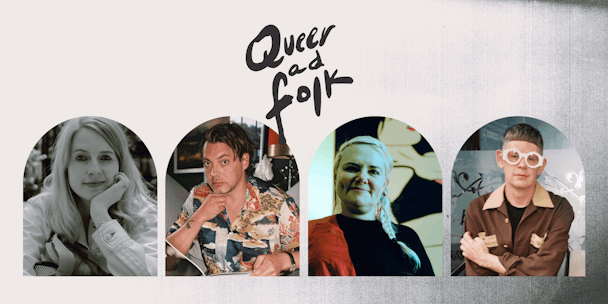
Queer Ad Folk: Laura Jordan Bambach, Matt Craigie Atherton, Rebecca Hughes and Ben Golik share their experiences
Welcome back! What a week. The big news, of course, was Queer Ad Folk launching with our first feature. But apparently, there was also some sport on.
Thanks to those who reached out with kind words. And please keep your support going with our next batch of super-talented folk.
Now, let’s get into it with Laura Jordan Bambach, Matt Craigie Atherton, Rebecca Hughes and Ben Golik. Oh, and why not give us a follow @QueerAdFolk when you’re done? Much obliged.
Laura Jordan Bambach, president and chief creative officer, Grey
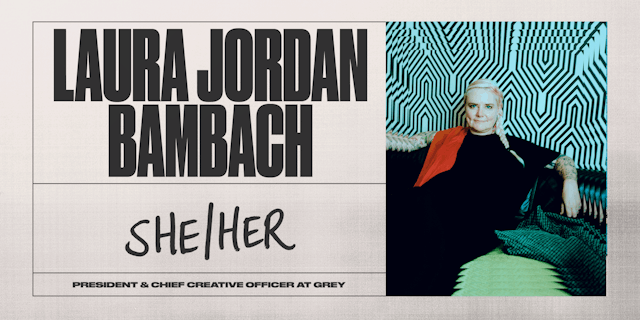
Have you always been ‘out’ at work?
“No. But there was never any sudden realization. It’s always been there. I very much identify myself as queer, because growing up in the 80s and 90s there was no such thing as ‘pan’ or even ‘bi’. You were always defined by the person you were going out with. If I’d go out with a woman, I’d be a lesbian. If I’d go out with a guy, I’d be straight. I didn’t fit in either, and I actually felt really judged by the LG community back in Sydney because of it.
“That’s why I’ve always said I’m queer – and queer is my family because that’s who I felt comfortable with. And it’s part of the reason I moved over to London because I felt so boxed in. I think my big journey has been one of becoming happy with who I am.
“It’s one of the reasons I’m so passionate about everyone finding a place of belonging, and not putting people into boxes. Just making sure everyone understands each other’s point of view. Because I remember how awful it felt to not fit in for such a long time.”
Does being LGBT+ help you in your job?
“I’m sure it does. I’m running an agency where, at the end of the day, it’s all about people. And people need to feel psychological safety. And because of the experience I’ve had, I make sure we’re allowing that space and intervening if not. I also think being queer enables me to get under the skin of audiences a little better – more of an acceptance and willingness to learn about different people’s point of view.”
Would you say that advertising is open-minded?
“I would say that until we have an industry that is truly diverse – and I’m thinking about intersectionality here, as well – where we can build a culture of belonging and acceptance of people regardless of who they are... then we are not as open-minded as we think we are.
“More people need to recognize people as people, and not just one thing or the other thing. We’re all multiple things. And I would like to see more of that within the business we’re in.
“We need to embrace hiring people of difference. I’ve not seen much LGBT+ diversity out there in advertising and it shows in the work we make. We’re getting better, but we can’t represent a group – or person – without having someone in there to make sure that it’s a respectful representation. At Grey we have a rule, which is ‘nothing about us, without us’.
What’s the best way for colleagues to be good allies?
“If there was one thing, it would be to make sure you’re inclusive of people. Making sure you do really simple things like respect boundaries and privacy. You never know what you don’t know about someone. Whether they’re happy to share or not, where they are in their life, or whether they’re still questioning. It seems obvious, but treat people like human beings. Ask them about what they want to be involved in, how to be spoken to, what their pronouns are. That matters. It really matters.”
Any words of wisdom for queer newcomers to the industry?
“Number one – don’t listen to people. Because you only know about who you are, yourself. And if it takes some time to get there, then it takes some time to get there. It’s allowed. You’ve only got one life, explore who you are, find who you are, and be really happy with that. Don’t settle for what someone else tells you is right. I think that’s the most important thing.”
Matt Craigie Atherton, director of production and operations, New Commercial Arts
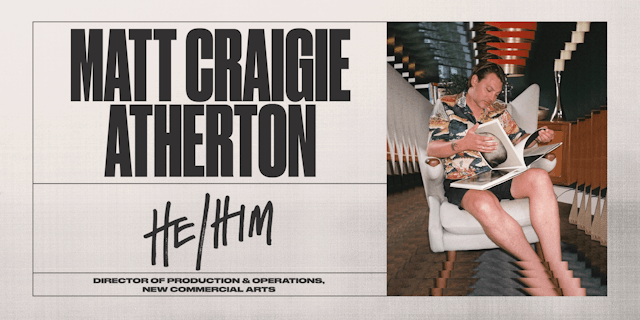
Have you always been ‘out’ at work?
“I’ve professionally always been out. But in my first job in the industry, I certainly was never particularly explicit about it. Purely because I was trying to get my foot on the ladder, and it wasn’t so much about my personality, or what I was bringing to the company as a human – it was more functional than that. But thinking about it, maybe I was hiding myself away a little bit...
“A few years later, when I was more established, I realized the director I was with didn’t know that I was gay. I would’ve felt comfortable telling him apart from the fact that it was quite late to do so in our relationship. I remember thinking, ‘oh shit, I should’ve been more obvious or, y’know, vocal from the beginning.’ I am really fortunate in that I had a supportive family so didn’t have any trouble coming out, and I think I used to take that for granted.”
Have you ever seen someone like yourself in management?
“There wasn’t a lot 20 years ago. I think it would have been a lot more helpful, encouraging and settling even to see it. But equally, I never saw it as a stopper. I just carried on regardless. I think now there are loads of really great, inspirational people who’ve done very well who either quietly happen to be (or are quite loudly and proudly) gay. It’s great that there are people now who actually champion being who you are. I feel I should probably do more in that area, to not shy away and to stand up a bit more.”
Would you say that advertising is open-minded?
“It can outwardly try and show itself as being more forward-thinking, but probably internally it’s not particularly any more forward-thinking than other industries. In fact, the banking sector, or even retail, can actually be a lot hotter on inclusive programs. I think adland would love to be more like that, but truthfully I think it reacts to what it thinks people want it to do, rather than slowly changing behind the scenes. Especially in the LGBT+ area, I’ve never seen anyone proactively try to recruit people in that community, or make them comfortable.”
Any LGBT+-inclusive ads that you think are great?
“Absolut Vodka has always been supportive. Particularly when it did that kiss commercial. I think it was BBH London. It didn’t shy away from showing same-sex people kissing and then projecting their logo over that. It wasn’t just a sort of peppering to try and keep people happy, it was an out-and-out pride celebration. You can’t underestimate how epic those big strides are.”
Any words of wisdom for queer newcomers to the industry?
“I feel like every young queer person is going to have a bit of hesitation about entering the world of work because you assume you might meet people with old-fashioned attitudes. And I guess you can never completely get away from that. But what I would say is that if you are 100% authentically yourself then no one can call you out for that.
“I understand feeling isolated because it’s the unknown and it seems like a vast, cavernous industry. But it’s not owned by anyone who says some people are allowed in, and some aren’t. It’s made up of people who excel in it. It’s nothing to be scared of. In my experience, there are no barriers that are so, y’know, problematic or difficult that you can’t push them aside and shine through. Be yourself at all times – whatever that is – but also concentrate and knuckle down on the thing that you want to do, and be the best at that.”
Rebecca Hughes, strategy partner, Havas Media
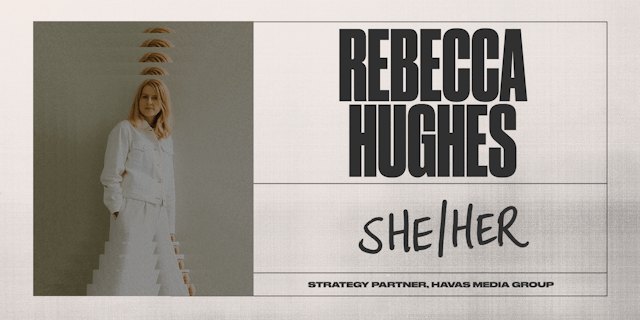
Have you always been ‘out’ at work?
“No, not at the start. I came into the industry straight after university and I hadn’t really figured all that out yet. I didn’t particularly volunteer the information at work. I think the first time I started talking about it was when I got a girlfriend when I was 27. And I was very fortunate that I didn’t have any backlash. I had very supportive people around me, in a small agency at the time.
“From then on I’ve just been very comfortable talking about it. I now often try to bring it up, not because it defines me, but because if I’m on a big stage and it’s relevant, I know it can make a difference, so I’ll slip a mention of my wife in. It’s just about letting others know there are people like them out there.”
Does being LGBT+ help you in your job?
“I don't think it gives me an edge to my work, but I do think it’s enabled me to meet more people and to be thrown into situations that I wouldn’t be if I wasn’t gay. For example, I was on the leadership board of the LGBT+ network of Omnicom Open Pride, which meant I got to meet so many leaders across the business in different areas that I would never have met if I wasn’t gay. Now I lead the D&I committee here at Havas Media Group, where we’re fortunate enough to have lots of brilliant volunteers from across the group. So, in terms of networking, definitely!”
Would you say that advertising is open-minded?
“I do think it’s getting better. One really powerful and reassuring thing I’ve seen while working in the industry was when a young woman, who was quite fresh out of university, did a talk to our entire agency about the bisexual flag and what it meant to her. That was her coming out at work. And she was so worried about the reception, but actually it was great, and she got a huge round of applause. It was just an amazing day.
“I’d also say representation is improving in advertising. You see more incidental queer characters in ads, for example, and that’s where we should be going.”
What’s the best way for colleagues to be good allies?
“Something we say in the D&I committee is that we’re all going to get it wrong. We’re all going to say something that isn’t right. But we’re all learning everything together. It’s better to be open and get gently corrected than not talk about it at all.
“One simple thing is rainbow lanyards. They seem really token on the surface, but actually, little things like that can have big effects on individuals. At a Stonewall conference, they told a story of a trans employee being interviewed who saw the rainbow lanyard, which gave them the confidence to ask about the policies that would affect them. Toilets, too. More inclusive design to help anyone who’s coming into the building feel they can be themselves and won’t be questioned.”
Any LGBT+-inclusive ads that you think are great?
“For me, the ‘Rainbow Laces’ campaign is great, and that’s gone on for years. Because with football, there’s a lot at stake with losing fans. The more the Premier League does, the more it potentially rubs its supporters (and therefore consumers) up the wrong way. And they risk losing income. That’s what I admire most. It’s tangible action. Not just talk.”
Ben Golik, chief creative officer, M&C Saatchi
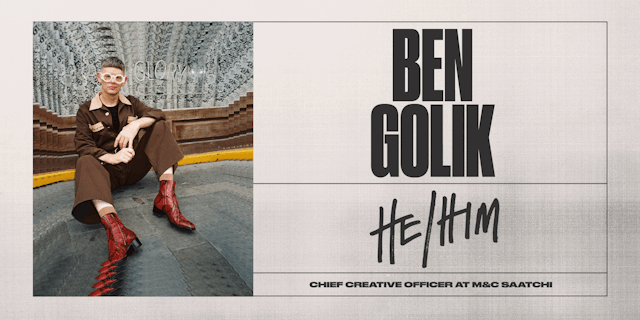
Have you always been ‘out’ at work?
“I’ve always been out at work. I never really had a choice to be in, but I wasn’t really pushing the agenda. Almost not wanting to be put in that box. As opposed to, y’know, being ‘the homo’.”
Would you say that advertising is open-minded?
“No. And given that close-mindedness shuts down creativity, that is a problem. I don’t think we’re deliberately close-minded, I think there isn’t enough life experience in agencies for them to be as open-minded as they should be. There are specific strands of life experience that are overrepresented. And other strands that aren’t there at all.”
What’s the best way for colleagues to be good allies?
“I think being respectfully curious to other people is a good way to expand your horizons and have a conversation. It’s not about putting people on the spot and asking difficult, uncomfortable or awkward questions. It’s about engaging with them about what their life is like, and being open to hearing about it.”
Any LGBT+-inclusive ads that you think are great?
“I think Starbucks’s ‘What’s Your Name?’ was a good example. I think it was sensitively made, and really what was nice about it was it touched on a truth about identity. For somebody who’s transitioned, or is transitioning, for their chosen name to be voiced for the first time... that’s powerful. And also the media schedule seemed to stretch beyond June, which is encouraging.
“On the other end of the spectrum – Bud Light. To be a frat bro beer and to have the gall to hijack the actual letters that define the community (LGBTQ) and to reduce it to ’Let’s Grab Beers Tonight, Queens’? It feels reductive. It feels disrespectful. The brand had no permission. Really gross.”
What advice would you give brands making Pride content?
“At the moment it seems to be more box-ticking than genuinely wanting to reach out to the queer community. What’s happening the other 11 months of the year, you know?
“In terms of representation, perhaps less of the obvious, stereotypical casting and just being a bit more poly about it will open up space for people to read themselves into it. Room for interpretation. The multiplicity of individual experience is so rich and wonderful.”
Any words of wisdom for queer newcomers to the industry?
“I really hate this ‘bring your whole self to work’. That phrase really annoys me. I think people have to bring the bits of themselves that they’re comfortable bringing to work. And accept that that will change over time and across workplaces. Don’t feel this pressure to turn up and do a musical number on day one, because that’s probably not who you are. There’s particular pressure on queer people to sort of go, ‘oh god, there’s so few of us... I need to represent’, but you don’t have to turn up and be some complete embodiment of representation for the queer community.”
Big thanks to Laura, Matt, Rebecca and Ben for taking the time to get involved. If you’d like to get involved or know someone we should be featuring, slide into the DMs @QueerAdFolk or email us at queeradfolk@gmail.com. Tune in next week for more Queer Ad Folk.
Co-founders of Queer Ad Folk, John Osborne is a senior creative at Creature while Oli Rimoldi is creative director at Mother.
